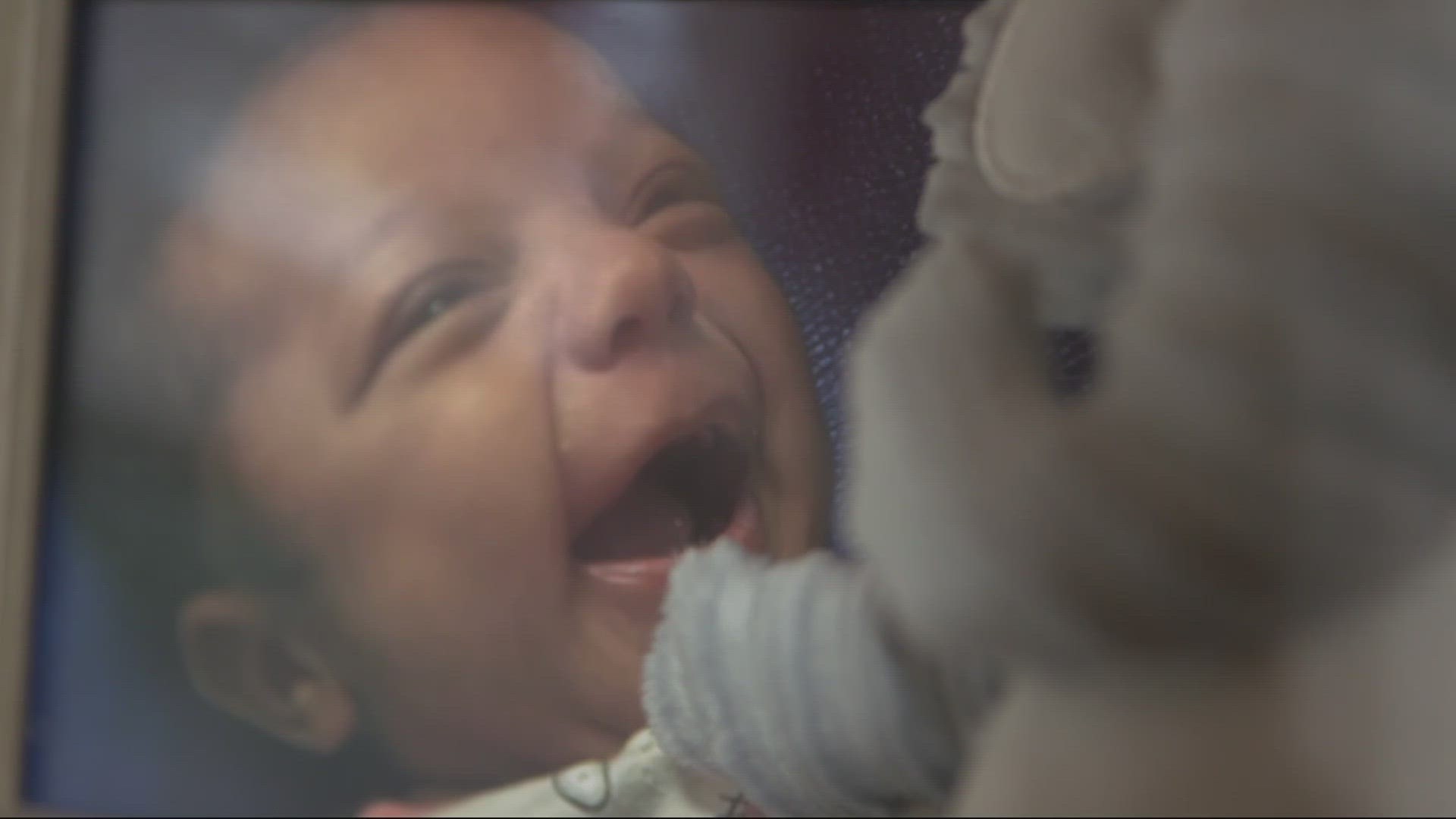JACKSONVILLE, Fla. — When a child is hurt or killed, police often look to the parents first. In the early stages of an investigation, grownups occupy a gray area between grief and guilt.
For one local family, that limbo lasted five hours.
Physically preventing from leaving their driveway to follow their baby to the hospital, they say the actions of the Jacksonville Sheriff’s Office deprived them of properly grieving their baby’s death.
“It left a very huge hole in our hearts,” says the child’s grandma, Heather Asher. “We weren’t able to say goodbye.”
The family filed a formal complaint with the Jacksonville Sheriff’s Office, but no officers were disciplined.
“Their conclusion is that ‘it is a training issue,’” says the baby’s mother, Erin Horning. “It's not a training issue. There was no compassion.”
"Waiting and waiting and waiting"
The November emergency began with a lightning-fast police response. Officers were in the family’s living room and performing CPR on Baby Alani within minutes of Horning’s 911 call. She woke, just before 4:30 in the morning, feeling unwell.
She says the 2-month-old was on her back, with no bedding around her, just as she’d been placed. But Horning said when she touched the child, she realized she wasn’t breathing.
“I started to freak out. I called 911. Thankfully, I'm CPR certified. So I know the correct way to do it. But she wasn't coming back.”
Baby Alani had medical challenges from birth – a low Apgar score, severe jaundice, and an abnormally narrow esophagus that caused her to vomit frequently. She'd been to the pediatrician just two days earlier, who'd ordered her to be placed on a different formula and taken off a medication that wasn't working.
“From the day that Alania was born, there were some, you know, she just kind of had a lot going on," Asher says.
The baby wouldn’t officially be pronounced dead until after she arrived at the hospital, but there was little mystery among those at the scene.
“It’s not looking good,” one officer murmured on bodycam footage. Horning, bereft, sat on the driveway, wailing.
Initially, officers told her she could either ride in the ambulance or follow behind. “You’re good to go, if you all want to get down there,” one officer said in bodycam video.
But as Horning waited in the passenger seat of her mother’s car, a shift change approached. Officers who said she could leave now said she’d need to wait. New officers arrived. Three squad cars blocked the driveway. And hours passed.
“We were just waiting and waiting and waiting and waiting,” says Asher.
One officer can be heard on bodycam telling another, “Just stall for a while.”
JSO declined to discuss this specific case, but noted, “death investigations, with exceptions, are homicide investigations and in those cases, it would be protocol to keep witnesses and/or potential suspects detained and separated from other witnesses and/or subjects.”
JSO policy on homicide investigations does not include directions on how to manage grieving parents after a child’s death.
A Department of Justice guide titled 'Investigating Child Fatalities' says, “Until the investigator or detective arrives, the first responders should obtain the names of those present and their relationship to the child. The officers should allow no one to leave the location until this information is obtained.”
It notes that such scene can be “very emotional,” and urges officers to practice “patience and diplomacy.”
The Final Hours
At 5:15 a.m., Alani was pronounced dead by a doctor who told police she saw no signs of abuse or foul play.
“At 5:15 in the morning, we were cleared by the hospital of any wrongdoing,” says Asher. “We could have been let go. But they didn't. For five hours.”
When they were cleared to leave, police said there was no point in going to the hospital.
“They were telling me, 'You can go to the hospital, but you are not allowed to see her because she is state property,'” Horning says. “I hate that phrase.”
In fact, the child’s father, whose name is not on Alani’s birth certificate, was allowed into her hospital room to say goodbye. But by the time Horning and her mother were released, the baby had undergone an autopsy. Her cause of death was determined to be “sudden unexplained infant death in association with an unsafe sleep environment.”
The next time Horning saw her baby was at the funeral home, a week later.
“We weren’t able to hold her at the funeral home because she’d been embalmed, and she's had an autopsy done,” says Asher.
Horning is tormented by thoughts of her daughter, isolated, in that hospital room. “Her soul was there, waiting for somebody to come sit next to her, so that she would be told it's OK,” says Horning. “She had to leave her own body alone, without me.”
Asher says they just hope sharing their experience helps someone. “One of the reasons that we really wanted to speak out is we don't want this to happen to another family.”
“We were mishandled,” she adds. “And it's not fair. And nobody should have to go through this. Nobody.”
Full JSO statement:
In reference to this specific incident, the incident reports, internal investigation, and body-worn camera will speak for themselves. Having said that, death investigations, with exceptions, are homicide investigations and in those cases, it would be protocol to keep witnesses and/or potential suspects detained and separated from other witnesses and/or subjects.
In a homicide investigation, the decedent’s body is evidence in the investigation and is preserved as such. While the attending physician can say whether there are obvious signs of foul play or abuse, it is out of their purview to say that no foul play or abuse is involved; such determination would be the responsibility of the Medical Examiner by way of autopsy.

